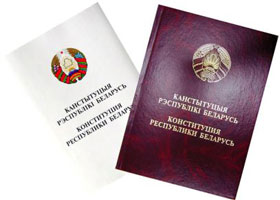Officials see no discrimination of Belarusian language speakers in the legislative process
Human rights activist Valiantsin Stefanovich has received replies from the authorities to his appeal to the Constitutional Court concerning discrimination of Belarusian-speaking citizens – virtually all the laws in the country are adopted in Russian, there is no official translation of legal acts into Belarusian, the other official language of the country. However, the officials don't regard it as discrimination.
In particular, the letter from the Constitutional Court, signed by Head of the Secretariat
A. Karavai, doesn't give an esential answer to the question of whether Art.7 of the Law "On Languages" and Art. 54 of the Law "On normative legal acts" are compatible with the Constitution.
At the same time, the answer states tha the Constituional Court has repeatedly considered appeals concerning the equal use of the two official languages in the service of bank cards, the state social insurance system, the organization of centralized testing for entrants and in the names of settlements.
The Supreme Court gave the following answer, signed by its deputy chairman A. Zabara: "In accordance with Art. 17 of the Constitution, the state languages of the Republic of Belarus Republic of Belarus are Belarusian and Russian. The Constitution of the Republic of Belarus doesn't provide for the obligatory publication of acts of state bodies of the Republic of Belarus in two official languages – Russian and Belarusian. Thus, there is no reason for proposing the Constitutional Court of Belarus to verify the compatibility of the aforementioned norms with the Constitution of the Republic of Belarus".
The House of Representatives of the National Assembly, as previously reported, also sees no reason to appeal to the Constitutional Court.
The Council of the Republic holds the same position, while its response notes that a number of articles of the Law "On Languages" provide the opportunity to choose the Belarusian or Russian language. In addition, the letter with reference to the Law "On normative legal acts" emphasizes that the official publication of the legal act in other languages is allowed only if there is an official translation into the corresponding language.
The Presidential Administration offers to use the translation at the website of the National Center of Legal Information. As it is stated in the answer, signed by Head of the State Law Department of the Presidential Administration A. Matselski, "the data bank ( ... ) provides for high-quality translation of legal acts from the Russian language into the Belarusian and vice versa”.
Valentin Stefanovich said that he tried to use the on-line translation tool of the National Center of Legal Information and was unpleasantly surprised: "The translation untidy and contains many errors. For instance, the heading of Article 1 of the Electoral Code is translated as "Relations regulated by the real Code". The heading of Article 13 of the Land Code is translated as "Land plots are not subjects to giving to private property, the property of foreign states and international organizations". The translation of the Law "On amendments to the Code of Administrative Offenses" (from 14 June 2004, edition No. 290-3) contains the phrase "beckon by a fine" (Article 1, concerning changes in Art. 23.9 of the Code of Administrative Offenses). But in any case, it is an unofficial translation, and I have appealed to the Constitutional Court and other state agencies concerning the official publication and translation of all legal acts of the Republic of Belarus in the two state languages – Belarusian and Russian."
The human rights activist stresses that he will raise this issue at the international level, in the Human Rights Committee of the United Nations. Even today there are several precedents when citizens are refused in the conduct of the trial in Belarusian, with reference to the law "On languages".


















